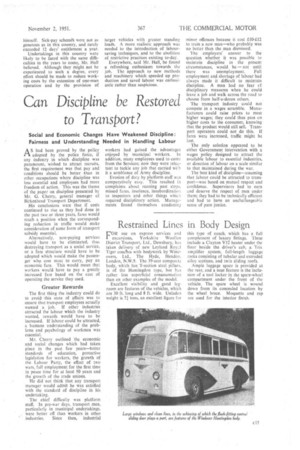Can Discipline be Restored
Page 53

If you've noticed an error in this article please click here to report it so we can fix it.
to Transport?
Social and Economic Changes Have Weakened Discipline: Fairness and Understanding Needed in Handling Labour
AS had been proved by the policy adopted by the police force, if any industry in which discipline was paramount, wished to attract recruits, the first requirement was that pay and conditions should be better than in other occupations where discipline was less essential and employees had more freedom of action. This was the theme of the paper on discipline presented by Mr. G. Cherry, general manager ef Birkenhead Transport Department.
His conclusions were that if costs continued to rise as they had done in the past two or three years, fares would reach a position when the corresponding reduction in traffic would make consideration of some form of transport subsidy essential.
Alternatively, non-paying services would have to be eliminated, thus destroying transport as a social service, or a fare structure would have to be adopted which would make the passenger who cost most to carry, pay an economic fare. This would mean that workers would have to pay a greatly increased fare based on the cost Of operating the service they used.
Greater Rewards The first thing the industry could do to avoid this state of affairs was to ensure that transport employees actually wanted a job. If other industries attracted the labour which the industry wanted, rewards would have to be increased. If labour could be attracted, a humane understanding of the problems and psychology of workmen was essential.
Mr. Cherry outlined the economic and social changes which had taken place in the past few years—better standards of education, protective legislation for workers, the growth of the Labour Party, the effect of two wars, full employment for the first time in peace time for at least 50 years and the growth of the trade unions.
He did not think that any transport Manager would admit he was satisfied with the standard of discipline in his undertaking.
The chief difficulty was platform staff. In pre-war days, transport men, particularly in municipal undertakings, were better off than workers in other industries. Since then, industrial
workers had gained the advantages enjoyed by municipal workers. in addition, many employees used to come from the Services; now they were reluetant to tackle any job that carried with it a semblance of Army discipline.
Evasion of duty by platform Staff was comparatively easy. This resulted in complaints about running past stops, missed fares, insolence, insubordinatioa to inspectors and other things whicn required disciplinary action. Managements found themselves condoning minor offences because it cost kW-in to train a new man—who probably was no better than the man dismissed.
"the employers' answer to the question whether it was possible to maintain discipline in the present circumstances, would be— not until there was unemployment. Full employment and shortage of labour had always made it difficult to maintain discipline. A man had no fear ef disciplinary measures when he could leave a job and Walk across the road to choose from half-a-dozen others.
The transport industry could not compete in a wages scramble. Manufacturers could raise prices to meet higher wages; they could thus pass on higher costs to the consumer, knowing that the product would still sell. Transport operators could not do this. If fares were increased, traffic might be lost, The only solution appeared to be either Government intervention with a wages policy designed to attract the available labour to essential industries, or direction of labour on a scale similar to that maintained during the war.
The best kind of discipline—assuming that labour could be attracted to transport—was based on mutual respect and confidence. Supervisors had to earn and deserve the respect of men tinder them; they had to be technically efficient and had to have an unchallengeable sense of pure justice.




























































































